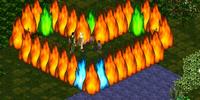| |
Site Navigation
Main
News
Forums
Games
Games Database
Top 100
Release List
Support Files
Features
Reviews
Previews
Interviews
Editorials
Diaries
Misc
Download
Gallery
Music
Screenshots
Videos
Miscellaneous
Staff Members
Privacy Statement
|
|
The game formerly known as Ultima 1 Reborn has been renamed to Era: The Arken Throne. The first Dev diary has popped up at the Peroxide Forums now (they call it "Babble Post"). Here's an excerpt:
Today I’ll tell you something about shadows in computer games and how we’re using them for the PXD engine. Shadows are a hard and hot topic in graphics computer science because no one has yet presented a totally perfect solution. There are several techniques that are commonly used and each has its strengths and weaknesses. Before I discuss any of them lets think for a second about what we actually wants from our shadows. The first question is whether we want “soft” or “hard” shadows. Or rather, we always want soft shadows if we could get it but unfortunately that’s not as easy as it sounds. By “soft” or “hard” I’m referring to the shadow edge. If you look at a real shadow in real life ™ you’ll see that its edge is usually soft – the transition from shadow to light happens over a certain area. The larger the light source is (the size of the light bulb in your desktop lamp for example) and the closer the light is to the shadow-casting object the softer the transition is. However take a look at shadows in for example Morrowind, Mafia or even Doom3 – the shadows looks very sharp. It kinda looks like the outline of the shadow was drawn and then the interior were filled with a constant color… it looks like a cartoon shadow rather than a real one. From the titles of the games I mentioned it should be obvious that soft, dynamic shadows are not something you just do. We’re working on a novel technique here at Peroxide though that *might* give us soft and dynamic shadows – but more on that if/when we get there. |
|
|





 Era Dev Diary
Era Dev Diary